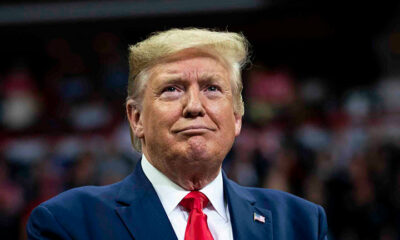Features
Cisi Eze: We Are Nigerians & ‘Corrupt’ is Our Default Setting
 Corruption is the new black. This means corruption is what’s fashionable. As per, black is seen as chic and fashionable.
Corruption is the new black. This means corruption is what’s fashionable. As per, black is seen as chic and fashionable.
When people think of corruption, they imagine an ugly, over-weight man donned in Agbada holding a Ghana-Must-Go. People think only politicians are corrupt. Guess what! Most, if not all of us, are corrupt.
Once upon a time, I was standing on a BRT queue at CMS. Ah! The queue was long. Some people, who refused to stand on the queue because they have two heads, were going to meet some of us standing at the front to help them get tickets so they would not have to stand on the queue.
The man in front of me said, “You are shouting corruption. Look at what you are doing. Is Buhari here?”
As he was walking to the back to join the queue, the corrupt man gallantly retorted, “Our leaders have failed us. What do you expect us to do?”
The dictionary defines corruption as “the act of corrupting or of impairing integrity, virtue, or moral principle; the state of being corrupted or debased; loss of purity or integrity; depravity; wickedness; impurity; bribery.
It is doing “bad-bad” things to enrich and better yourself at the expense of another person. Those men that refused to join the queue are corrupt. They wanted to get into the bus at the expense of other patient people standing at the back.
Corruption is a hydra-headed, multi-faceted problem that has gnawed into the fabric of the Nigerian society. Like a wound, it has festered and gotten septic to the point of rotten. The stench of corruption has pervaded every social institution. Every social institution in Nigeria- the family down to religion- abets corruption.
Look at the family, the smallest unit of society. Children are corrupt when they inflate the prices of books and lie they want to buy books they are not using.
Homemakers are corrupt when they inflate the cost of running their homes.
Breadwinners are corrupt when they partake in shady deals at their places of work. E.g. Inflating the prices/cost of things.
What do we say about the cleric that misuses funds meant for maintenance of his/her religious centre?
The politician that steals from the governed through various means at his/her disposal, e.g. receiving a ridiculously fat salary while people are suffering, is corrupt.
The journalist that ignores a story because he/she has been silenced with money is culpable of this act, too.
The policeman or judge that takes bribes is corrupt.
CORRUPTION IS OUR CULTURE! It has been institutionalised here in Nigeria.
Who is the problem of Nigeria? Nigerians!
What makes up Nigeria? Breeze, fishes, and leaves? Hahaha! When you look at it, one is compelled to give a bribe in a bid to get certain things. A friend told me, “Only by being corrupt can you get ANY service at a decent time. Corrupt is the new normal.”You want to get a job and someone is telling you to pay a certain amount of money. If you have been in this situation, you know what I am talking about. You might have given the bribe and asked God to forgive you. You even went on to say, “I leave it to God” because the Nigerian legal system has inadvertently become the paragon of corruption- you can’t report the person to the authorities. Why not fix our legal system? Why do we leave everything to divine intervention? This, dear friend, is the cause of most of the problems in our country- We are WAITING for external help. We’re waiting for things to happen. We are not happening to things.
Are there punitive measures to serve as deterrent to offenders? Are there structures in place to prevent corruption? Do we treat corrupt people as the criminals they are? Au contraire, we celebrate and idolise them. Imagine a situation where there were punitive measures meted out on corrupt people- they steal, they go to jail. Don’t you think everyone would sit up?
Our lawmakers are there doing nothing. Of course, they won’t push for an anti-corruption bill that punishes criminals. Because they know they are culpable.
We should be ashamed of ourselves for normalising corruption. How do we explain that a very religious country, with at least one religious centre within a distance of five streets, is highly corrupt? When we said we wanted change, we didn’t realise we are the ones to bring about change. If divine intervention could end corruption, all those prayers would have ended it. Aren’t we a joke? Many religious centres, few factories. Even Solomon said, “Go to the ants and learn from them.” But here, we want to pray ourselves into economic growth and development without getting rid of dark deeds. How, please?
Nigerians are intelligent and hardworking people; however, the structures on ground wouldn’t allow us to be great. Brilliant minds get frustrated here. Some move out to countries that support the same values we condemn and they shine. Doesn’t this bother you? WE MOVE TO COUNTRIES THAT SUPPORT THE SAME VALUES WE OPPOSE! Haha! We are corrupt hypocrites! Corruption and hypocrisy is wrecking our country like the queen and bishop in a game of chess. Shame!
Yes, we are Nigerians and we are corrupt by default because corruption has become a way of life, our culture.
Are we going to wait for the lawmakers to pass an anti-corruption bill?
Alternatively, are we all going to make a conscious effort to stop being greedy, selfish, and corrupt?
What is it going to be?
A friend once joked, “Can we just take these lawmakers to a remote island (…)?” But I told him that there’s no point sinking that island if the next crop of people would do the same thing their predecessors did.
WE NEED STRONG INSTITUTIONS. As Chester Arthur put it, “Men may die, but the fabric of our free institutions remains unshaken.”
We cannot eradicate corruption, we can only reduce its occurrence to the point it would not be an impediment to economic development.
Until then, you and I are corrupt. Uh-hmm…Very, very corrupt. If we want change, we have to change ourselves. Else, in hundred years, our grandkids will ruin things because corruption is our culture.
Photo Credit: Dreamstime



















